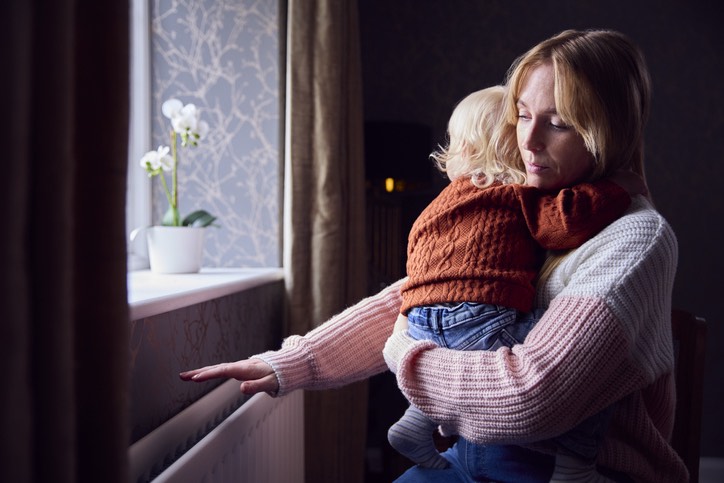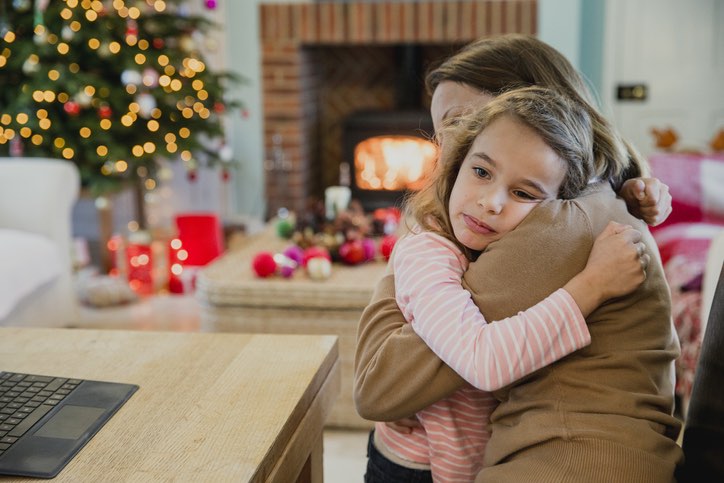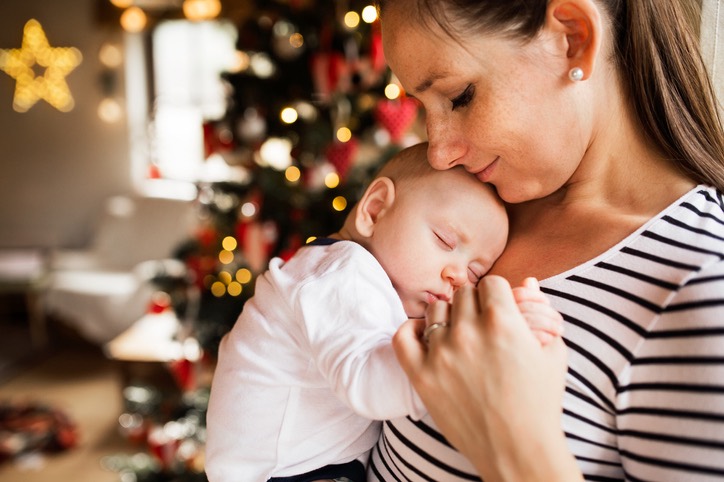How to Deal With Seasonal Affective Disorder Over the Holidays

The holidays are a time for family, friends, and fun. But for many parents, the holidays can also be a time of stress and overwhelm. Between shopping, cooking, cleaning, entertaining, and making the season magical for your children, it's easy to see how the holidays can become an overwhelming time of year.
Although many people experience stress and overwhelm around the holidays, persistent holiday stress and feelings of depression can be a sign of a more serious issue, like seasonal affective disorder.
Related: How Meditation Gets Me Through the Holiday Season as a Parent
What is Seasonal Affective Disorder?

Seasonal affective disorder (SAD) is a type of depression that occurs with the changing seasons, typically in the fall and winter. Unlike other mood disorders, like Major Depressive Disorder, SAD typically begins and ends at a specific time of the year, typically starting in the fall and continuing through the winter. This is why SAD is also commonly referred to as the winter blues.
Many people find that their mood and energy follow a seasonal pattern, their feelings changing fewer daylight hours during winter months. But for people with SAD, feeling down and hopeless can quickly become overwhelming and debilitating.
What are the Holiday Blues?

The holiday blues can refer to a few different things. In some instances, people may use the terms holiday blues, winter blues, and seasonal affective disorder interchangeably.
In other instances, the holiday blues refers to a specific kind of holiday depression. While the holiday blues are not a clinical condition or a distinct type of clinical depression, they can nonetheless be debilitating and interfere with a person's ability to enjoy the holidays.
There are a number of factors that can contribute to the holiday blues. For some people, the holidays are a reminder of loved ones who are no longer with them. For others, the holidays may be a time of financial stress or family conflict. The added pressure to be happy and festive can also be overwhelming and can contribute to feelings of sadness and overwhelm.
Who is Affected By Seasonal Affective Disorder?

SAD is a fairly common mental health condition - in any given year, about 5% of the US population, or 1 in 20 adults, will experience SAD. SAD also tends to be much more common in women - women make up about 80% of SAD diagnoses.
SAD also tends to be more common in people who live in climates with fewer daylight hours. In fact, one study found that instances of SAD become much higher the further someone lives from the equator.
Signs and Symptoms of SAD
The symptoms of SAD closely mirror the symptoms of depression. The severity of symptoms of SAD can vary greatly from person to person, with some people experiencing mild symptoms and others having more severe symptoms.
The most common signs of SAD include:
- Feeling sad, down, depressed, or hopeless more often than not
- Loss of interest in activities you used to enjoy
- Having less energy or feeling sluggish
- Changes in sleep, either sleeping more than usual or having difficulty sleeping
- Changes in weight gain, appetite, or overeating, including an increased craving for carbohydrates
- Having a hard time concentrating
- Thoughts of suicide
What are the Causes of Seasonal Affective Disorder?

While the exact cause of SAD is unknown, it is believed to be related to the change in seasons and the decrease in sunlight. The reduced sunlight may cause a drop in the body’s level of serotonin, a chemical that affects mood and well-being.
SAD may also be caused by the body’s natural circadian rhythms, which regulate sleep and wakefulness. The reduced sunlight in winter may cause the body to produce more melatonin, a hormone that makes you feel sleepy.
Strategies to Cope with Seasonal Affective Disorder

There are a number of strategies that can help people cope with SAD. These include:
- Light therapy: This involves sitting in front of a special light box for 30 minutes each day. The light from the box is thought to mimic the sunlight and can help to improve mood.
- Exercise: Getting regular exercise can help to improve mood and energy levels.
- Therapy: Talking to a therapist or other mental health professional can help you identify strategies to regulate your mood.
- Medication: Medications like antidepressants can be helpful for treating SAD. To explore this option, talk to your healthcare provider.
Dealing with Seasonal Affective Disorder When You Have Kids

For parents, dealing with SAD can be even more challenging. Juggling the day-to-day demands of parenting when you’re coping with a condition that zaps your mood and energy can feel near impossible.
In addition to the tips above, here are some additional tips for managing SAD when you have children:
1. Make Time for Yourself
It’s important to take care of your own mental health in order to be able to effectively care for your family. Find some time each day to do something that you enjoy, even if it’s something simple reading a book or going for a walk by yourself. Find any small way you can to practice self-care.
2. Ask for and Accept Help

Asking for help can sometimes be easier said than done, especially if you’re used to being the one who offers help and care to others. But when you’re struggling with mental illness, it’s not the time to try to manage everything on your own. Ask for help from your loved ones and accept it when offered.
3. Lower Your Standards
The holidays can be a time when you feel a lot of external and internal pressure to go above and beyond, especially if you’re a parent of young kids. Give yourself some grace and kindness by lowering the standards of what you expect of yourself.
Tips for Taking Care of Your Mental Health During the Holidays

Whether you have SAD or just feel the pressure of the holiday season, these last few months of the year can put added strain on your mental health.
Here are some tips to take care of your mental health during this busy holiday season.
1. Schedule Time for Yourself

Much of the holiday season is spent in service to other people, whether planning gifts, holiday parties, or other caretaking tasks. Make sure to schedule time for yourself during the holiday season. This can be time to relax, take a nap, or just do something you enjoy.
2. Be Mindful of Your Alcohol Intake
Alcohol can be a depressant and can negatively impact your mood, so be mindful of how much you're drinking during the holiday season. If you're feeling down, try to limit your alcohol intake.
3. Set Boundaries
You are allowed to set boundaries and limits on what you’re able and willing to do. Setting boundaries with your loved ones might look like seeing one set of grandparents on Christmas and the other on Christmas Eve, or hosting a small gathering of a select few family members at your home.
Consider your capacity and set appropriate boundaries as needed. You are allowed to make space for yourself and the things you need, even if it disappoints other people.
For more tips to cope with depression around the holidays or seasonal depression this winter, see our article on How to Enjoy the Holidays Like a Little Kid Again.

